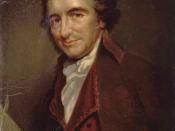The Enlightenment The Enlightenment was an 18th century European intellectual movement in which ideas concerning God, reason, nature, and man were combined into a world view that instigated revolutionary developments in art, philosophy, and politics. Although there are many separate stages to this period, it has been termed "the Enlightenment" for simplicity. The Enlightenment was characterized by the use of reason and rational thought. The goals of rational man were considered to be knowledge, freedom, and happiness. Three critically important factors to this movement were: a revulsion against monarchical power and clerical absolutism; a new freedom of publishing and rise of a new public and secular culture; impact of the scientific revolution, particularly with Isaac Newton's book, Principia (1867).
When Principia was published, censorship or imprisonment for ideas disliked by the church was still common. By 1750, extreme measures were rare anywhere north of the Alps or in the American colonies.
Scholars in Italy began to study the works of the ancient Greeks and Romans, and the ideals of education, art and intellect again appeared in society. Innovation began to permeate Europe, as humans discovered better ways to print books, tighten communications over distance, and cure diseases more reliably. Mankind started trying to deduce the laws of the universe. England's neighbor, France, erupted into the disorder of the French Revolution, killing their own king and harshly swinging from an absolute dictatorship to a radical republic.
Representative of the Enlightenment are such thinkers as Voltaire, J.J. Rosseau, Montesquieu, Adam Smith, Swift, Hume, Kant, G.E. Lessing, Beccaria, and, in America, Thomas Paine, Thomas Jefferson, and Benjamin Franklin. Enlightened oppressors such as Holy Roman Emperor Joseph II, Catherine II of Russia, and Frederick II of Prussia enforced the social and political ideals they presented. Diderot's Encyclopédie and the U.S. Constitution are representative...


